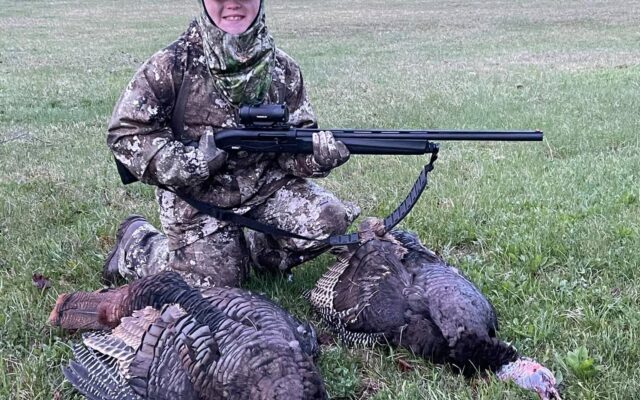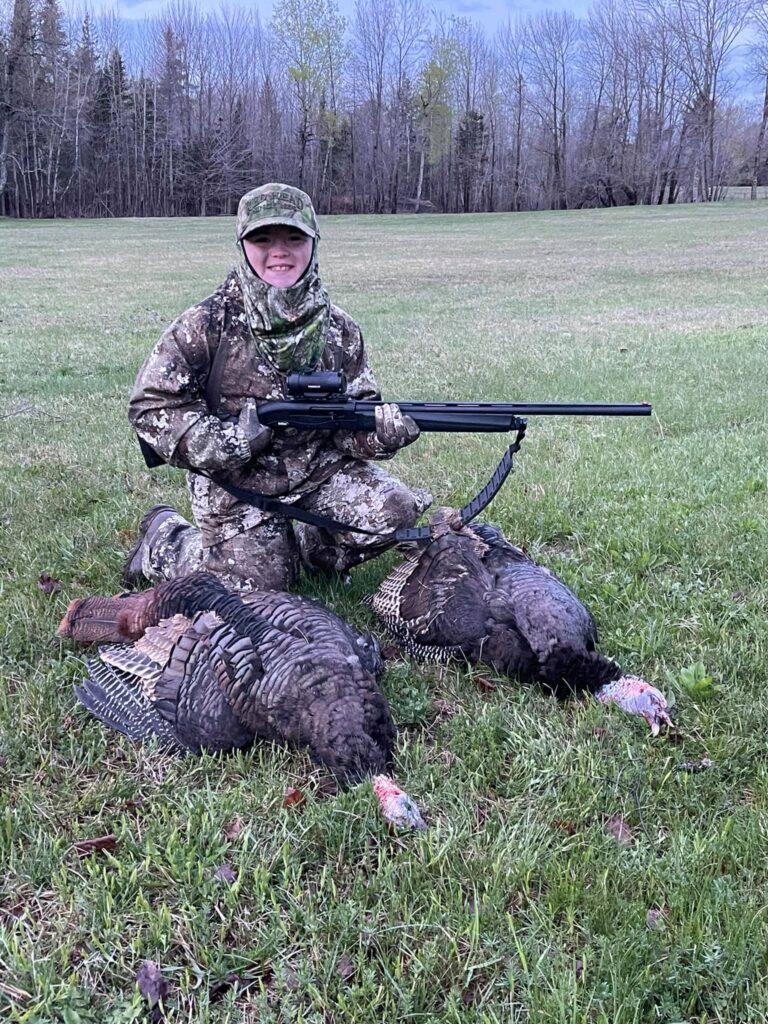
Maine hunters could start tagging turkeys electronically in 2023
By Pete Warner, Bangor Daily News Staff
Electronic registration of wild game is likely coming to Maine. And it could happen as early as next year.
Hunters who target wild turkeys in Maine would have the opportunity to register birds electronically under a bill expected to go before the Legislature during the next session.
The Inland Fisheries and Wildlife Committee recently recommended passage of LD 1992, a bill that would open the door for electronic tagging of turkeys statewide beginning in the spring of 2023.
If enacted, the law would give turkey hunters the option of using a computer or cellphone to electronically register harvested birds with the Maine Department of Inland Fisheries and Wildlife.

In this 2021 photo, Evan Annis of Dover-Foxcroft shows off the two wild turkeys he killed with one shot while hunting last spring. Hunters may be able to tag their turkeys electronically starting in 2023.
Under the proposed law, turkey hunters would still have the option of taking their birds to a licensed game station to register them.
Hunters who kill turkeys in Maine are now required to register the birds during the spring season only. A law passed last year, which suspended the requirement for hunters to tag turkeys taken during the fall season, remains in effect for 2022.
Maine law requires hunters to take all other harvested big-game animals to a licensed tagging station for registration, usually within 18 hours.
DIF&W is expected to report back to the fisheries and wildlife committee later this year with details about changes needed in the law to facilitate enacting electronic tagging of turkeys. Once those details are ironed out, the bill is likely to go before the new Legislature elected in November.
In a related development, the fisheries and wildlife panel recently opposed LD 1991, a companion bill that would have provided for the electronic tagging of deer, bear and moose.
While some committee members believe that electronic registration of big-game animals is coming at some point, it appears that time is not now.
The bill arose from concerns among hunters, guides and sporting camp operators who pursue deer, bears or moose in some of the more remote areas of Maine, especially in the northern region.
They argued that it can be a tremendous inconvenience for a hunter to kill an animal, then have to drive a long distance to register it at the nearest official tagging station. Transporting harvested animals long distances in warm temperatures can quickly lead to the meat spoiling before they can be tagged and processed.
That primarily affects bears and moose, which are hunted during warmer weather in the late summer and early fall.
DIF&W, in its January report to the fisheries and wildlife committee about the potential for implementing electronic tagging for big game, voiced numerous concerns in using such a system for deer, bear and moose.
The department stressed the importance of gathering biological samples from moose and bear, in particular, to study and manage their populations in Maine. Samples of moose teeth and ovaries, along with testing for the presence of winter ticks, are critical for biologists to gauge the health of the herd.
For bears, a tooth must be removed from the animal at the time of registration to determine its age.
DIF&W said reducing the number of deer brought to tagging stations would create a significant burden on its staff to obtain biological samples in areas of Maine where there are a limited number of game processors.
In an effort to assist hunters, DIF&W Commissioner Judy Camuso has proposed expanding the use of her authority to certify more Registered Maine Guides as official tagging agents.
Camuso met virtually with representatives of the Maine Professional Guides Association and other constituent groups, which agreed allowing more guides to tag animals would help reduce some of the issues related to in-person tagging at remote game stations.
With those concessions in place, and after some business owners voiced concerns to committee members about the potential for significant lost income from hunters tagging animals at their establishments, the fisheries and wildlife committee opposed the measure.
The door to electronic tagging is likely to be opened in 2023 for wild turkeys. The results will have something to say about whether Maine moves to some form of electronic registration of deer, bear or moose in the future.